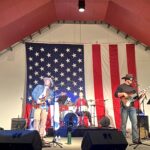
Photo by Steven King
Saturday, May 11, 2019, 7:30 p.m.
Lowman Concert Hall, IAA Campus
In the selection of the proper elements of a choral concert presentation, one should always take into account all levels of practical audience responses, and generally make them not only favorable as a whole, but also providing an education in the process.
From the projected advertising which led up to Saturday evening’s concert — beginning with the title — a diverse enough program was expected, and was certainly “favorable” to a fault in a most pleasing combination of instrumental as well as vocal styles. However, the overall dominant mode of the proceedings tended to minimize whatever selections could be determined as “operatic” in nature in the placement of the more “popular” items, and this inherent disparity naturally brought out a real disconnect between those methods of presenting a set piece in either opera or musical theater.
Perhaps if Director Dwight “Buzz” Holmes had revised his subtitle to “A Night at the Musicale,” it might have been better served, but from the fact that all was in proper order beforehand, singers in good voice and respectful of the rotation of the soloists and ensembles, the foregoing criticism was not as necessarily warranted as it might have appeared.
So, beginning with the set of numbers from Rodgers and Hammerstein’s “Carousel,” and from there proceeding through sets from “Les Miserables” and “Tommy” (this latter set as a nod to Mr. Holmes’s original production of the rock “opera”), the evening was overwhelming in presenting sheer vocal power, particularly in the numbers “You’ll Never Walk Alone” and “Do You Hear the People Sing” (to take the more salient examples).
That power display was carried over to the individual performers as well; in particular the efforts of Eric Bolton (in both the “Carousel” and “Tommy” excerpts) and Justin Patrick Holmes (in the “Les Mis” portion) are those that this listener would single out as significant, as well as in the overall blending of choral activity.
And in the scattering of the operatic pieces, and the leaving of works for solo performers as distinct as possible, the balance was partly maintained between ensemble and individual workings.
Ms. Dimyana Pelev’s interpreting of the “Habanera” from “Carmen” (complete with red dress) was subtly seductive in its vocal weaving, and John B. Fleming’s Puccini excerpt (the “Nessun Dorma” from “Turandot”) was equally persuasive in power as well as subtle.
Linda Wallace and Fredda Koupal’s vocal blending on the “Flower Duet” from Delibes’ “Lakme” was a floating world wonder, and the excerpts from Borodin’s “Prince Igor” brought both chorus and soloist (in this case, bass Chris Kruse) in a sensual swirl of soundscape possibility.
Only the Donizetti piece (the famous “Lucia di Lammermoor” sextet) failed to impress this listener; the lack of power displayed was probably due for the most part to the middle placement of the singers on the stage (instead of bringing all six of them up front, as usually performed). A minor detailing, of course, but still a lapse on the part of the presenters.
Nevertheless, the ensemble was well-behaved throughout — no interference was observed, and the accompaniments were well within the chorus and soloists proclivities; in particular, those of guest cellist Julianna Buffum Holmes and acoustic guitarist Erik Lingren (the latter providing a entertaining imitation of Pete Townshend’s “Kid Gavilán” playing style in the four “Tommy” examples) deserve special mention, as does the usual yeoman work of pianist Edwin Hansen throughout all parts.
A definitely smoothed performance, another feather in the cap of “Buzz” Holmes and forces, and a generally satisfied audience, who responded in kind with appreciative plaudits.










